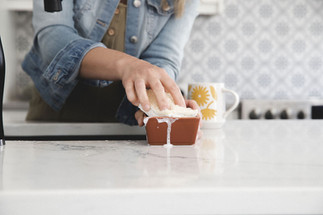
Most people wouldn't think of using anything other than liquid soap for washing dishes.
If you take a moment to think about it, conventional liquid dish soap was invented less than 100 years ago. What did people use to wash dishes prior to this? Quite a variety of things actually. Wood ash, soap nuts, oils, washing soda, lemon, salt, vinegar, hot water, grated bar soap, and quite a bit of elbow grease!
So, solid dish soap. It makes sense, but how does it work with a sink full of dirty dishes?
Here's a Simple Rundown:
If you'd like to fill your sink with water, go for it. However, all that is needed is for your dishes to be wet. Once you're done washing, pour off any water that has gathered in the soap bowl. This will extend the life of your soap, which will last you a very long time!
(See the end of this post for tips on how to extend this time as much as possible!)
And here's the kicker - the ingredient list is two things: saponified coconut oil (a.k.a. coconut oil that's been turned into soap) and some essential oils for a fresh scent.
And how about another perk? Not only does this solid dish soap lather beautifully and clean up all those foody messes, it can also be used for so much more than just your day-to-day dishes, pots and pans!
What About Cleaning Bottles?
This is the number one question I hear as people are looking to switch to solid dish soap - how do you clean bottles if you can't squeeze liquid soap in? Quite easily in fact!
While using your solid dish soap, water will naturally gather in the bowl and become soapy water. It's important to pour this water out when you're done washing up to keep your soap nice and hard and extend it's life... so... save washing your bottles to the end and simply pour this collected soapy water into your bottle!
Use it For More Than Just Dishes
Use your Solid Dish Soap as a multipurpose cleaner around your entire home, including the bathroom. It's a fantastic window cleaner and cuts through the grime on kitchen windows with little effort. Clean your makeup brushes, small paint brushes, and so much more. It's also a great option to bring along camping. The possibilities are almost endless!
What are you missing out on? Plastic bottles!!! Oh, it feels so good to avoid these. You'll also miss the inevitable times when all the bubbles are gone from your sink full of once-was-soapy-water-now-turned-dirty-and-oily and you have to choose to trust there's still soap in there doing it's job. Plus, you'll miss out on harsh ingredients and most likely toxic chemicals absorbing into your body and going down the drain. Sounds good to me!
Refill Pucks for Your Bowl? Yes Please!
At Searl Soap Company, I have a continual goal of becoming as zero waste as possible in both my production and packaging. One of the ways I do this is by offering refill dish soap pucks. Hold onto your empty bowl and simply buy a refill puck!
Choose your desired scent and simply place your refill puck in your empty bowl. The square design prevents your soap from spinning during use as well as "chasing" the soap remnants once your bar is almost used up. Tuck them in the corners and see just how effective those little remnants still are!
How to Extend the Life of Your Dish Soap
Another great way to reduce consumption, waste and money spent is to keep a few simple things in mind that will extend the life of your soap!
The most important one is to pour off any water that has gathered in the soap bowl during use. This allows your soap to dry faster and stay nice and hard!
Secondly, do not store your cloth, sponge or brush resting on your soap. Like the first suggestion, this allows your soap to dry faster and stay dry when not being used.
The more frequently the soap is used during the day, the more quickly it will be used up. For example, if you use the soap 6 times a day for little jobs as opposed to 3 times a day for bigger jobs it will not allow the soap to dry fully between uses and over time the top area will become softer. It is absolutely fine to use the soap this often, you'll just work through it more quickly.
The more abrasive your washing tool, the faster it will work through the soap. Because of this, using a cloth will give you a longer soap life than using a brush.
One last note: this dish soap lathers up beautifully without much effort! If you're using a brush with it and finding your soap is not lathering very quickly or well, it could be that your brush is too abrasive and gouging the soap rather than working up a lather. My Pot Brush or Dish Brush work wonderfully for everyday use with this dish soap!
For over a year after I began making this dish soap for our family to use, my husband actually enjoyed washing up the pots. Here's hoping you have some happy washing ahead of you as well!
(As always, other than links to my own products, the links included in this post will bring you to more information, not where to buy a product.)

















I just discovered your products and site, amazing! I'm trying out the shampoo bar (haven't had much luck with those over the years but i'm willing to keep trying) and also purchased the solid dish soap. One question I had is - how can just saponified coconut oil get rid of serious bacteria like e. coli and salmonella? Thanks so much for sharing all of your insights and advice in this blog!